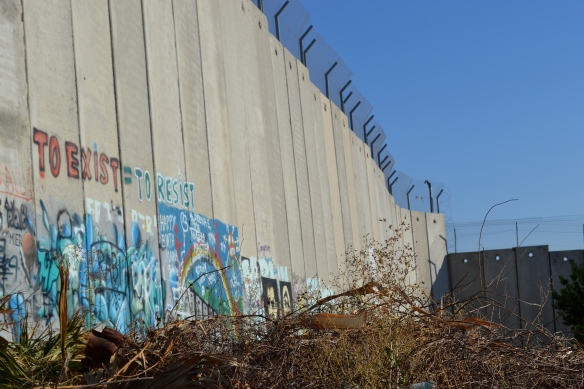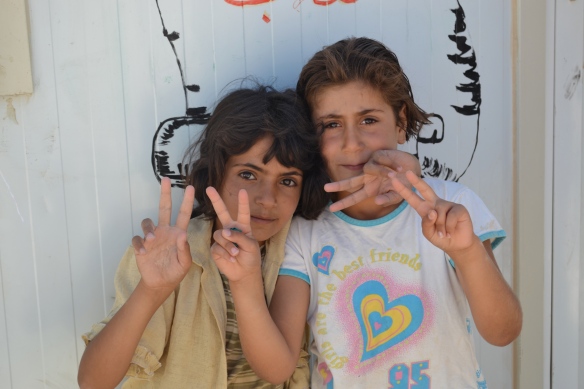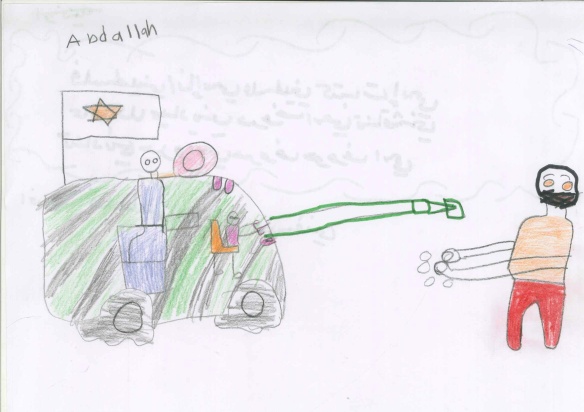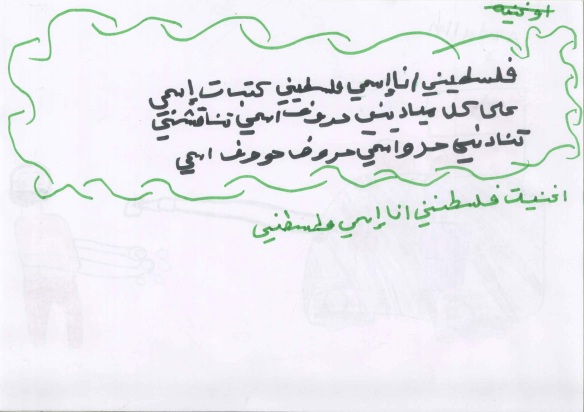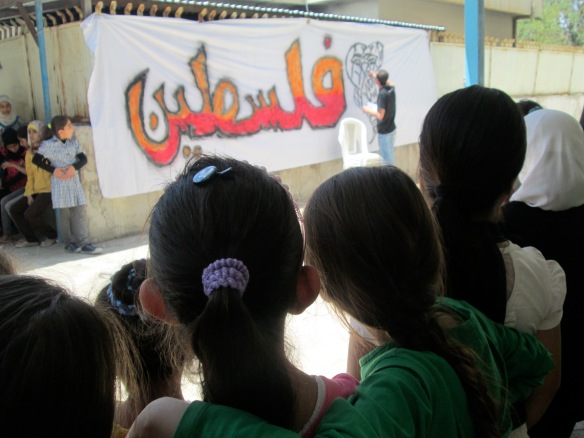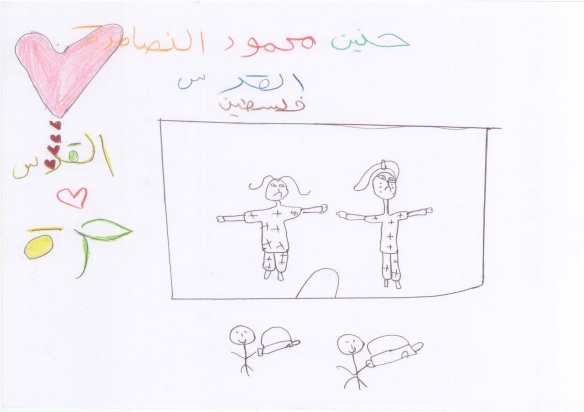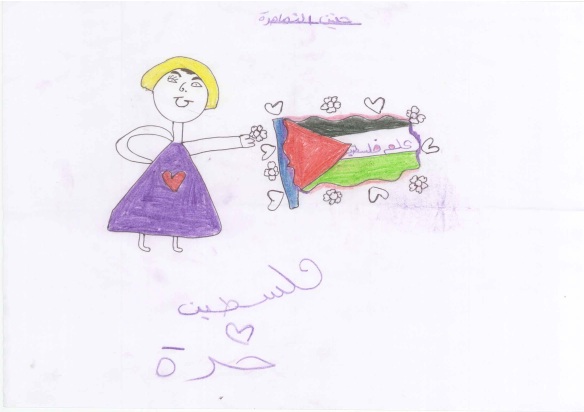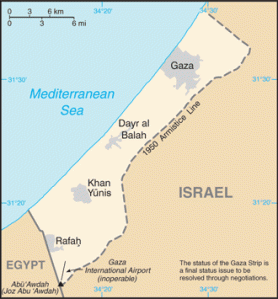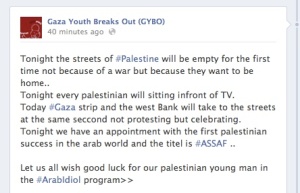Bethlehem – Palestine
Tag Archives: occupation
Oh Children of the World
This week, I heard a beautiful song called ya atfal al 3lim or “Oh Children of the World.” Apparently, its a very famous song – as the story goes a young Syrian girl named Hala sang it in Arabic, Italian, Turkish, Spanish.. you name it.. at the United Nations. Everyone here was surprised I had not heard it before.
I’m not sure if an English version exists – but after hearing it sung at Zaatari Camp this week by a young Syrian from Deraa, I have fallen in love with the song. Though its much more beautiful in Arabic/Italian, with help from a friend, the translation is below – along with some pictures from Zaatari.
Sing with us for our childhood,
oh children of the world
With your happiness and our happiness,
we build the world’s glory
We are from the homeland of freedom,
and we call you from Syria.
oh children of the world
Let’s call to those older than us,
our future is in your hands
So that no one forgets about us – and protects us
Until we grow up like a green branch,
a grain of wheat becomes a whole field,
and our knowledge becomes larger,
Oh children of the world
Do not forget the children deprived – in every country occupied
Or children living oppressed
Or a tear burning in his eye
No to hunger and no to injustice
No to despair and no to fear
No to ignorance and no to violence
around the world
Oh Children of the World
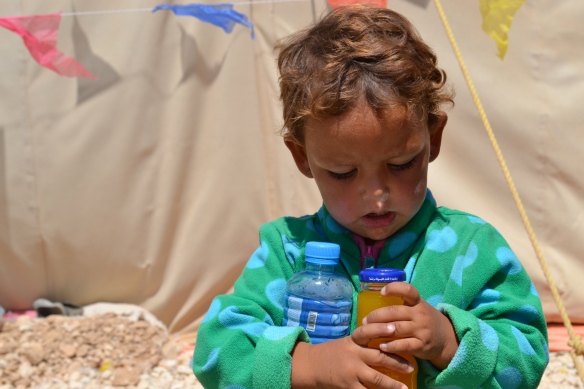
By Abdullah, age 10
Student Depictions of Palestine
Just over a month ago, on May 15, the Arab world observed “the Nakba.” This day is a rememberance of the 1948 war, the creation of Israel, and the exodus of Palestinian refugees who fled their homes. The Nakba means “the catastrophe” in Arabic.
Around the same time, a former Fulbrighter approached me with a project for her grad program at Georgetown. She is designing a curriculum for Washington, DC students that teaches history and current events using the stories of refugees. Would Baqaa’s youth have anything to contribute?
So Marah and I designed a program. As part of the Nakba rememberance, we asked students to write or draw about Palestine — to give us a depiction or a narrative that would help American students understand Palestine better. “What does Palestine mean to you? What does being Palestinian mean to you?” we asked them; then we let them present whatever they wanted to present.
Haneen and Bayan watch as volunteer teacher Khalid makes a banner (reads “Palestine” in Arabic) – for the Nakba rememberance at the Center
I want to share these drawings and writings with you all. First of all, because the students did a really great job. The artwork is beautiful; the narratives are compelling. I am eager to share their voices. But second of all, because I think its important and relevant to see how deeply these students love Palestine and how much they want to go back.
The students in Baqa’a camp are all refugees from Palestine – but they were born in Jordan and they are Jordanian citizens. It was their grandparents, or perhaps their parents as young children – who fled Palestine during the 1948 and 1967 wars. Yet their families have grown up in this refugee camp-turned-town, dreaming of going home.
I think I understand the Palestinian cause a lot… but even I was surprised at the depth of these writings and the sadness of these drawings. Sometimes its hard for me, like many other Americans, to understand the Palestinian’s insistence on the “right to return.” Its hard to grasp the deep connection to land — because I’ve never had a home taken from me – never had to live in a place I felt I didn’t belong – never felt I’ve been wronged with no apology or recognition.
The project made me sad a lot. The kids are so young to have these images and thoughts in their minds. But no matter how many times I told them, “irsmeelee ishy 7elu 3n filistin .. draw me something beautiful about Palestine,” students kept drawing sad pictures. Halfway through the program I had the words dababa, qatilu, and yehud (tanks, killing, Israelis) memorized.
So to start: two drawings from Haneen, an 8 year old girl.
She proudly showed me her picture, which broke my heart, then complied to my request to draw something beautiful and happy about Palestine.
“Miss, these are the Palestinians killed in their homes”
Translation: Haneen – Palestine – Jerusaleum <3 Freedom
Translation: Palestinian Flag – Palestine <3 Free
The Arab Idol from the Gaza Strip
I can’t claim to have ever seen a full episode of Arab Idol… Yet, I have in the past days gained a new interested due to one of the three finalists: Mohammed Assaf.
This week as I travelled Palestine, visiting my friend Marah’s family in Nablus and a nearby village, Jen Safout, I kept hearing about Mohammed Assaf. He has an amazing story. Assaf, a young 23 year old Palestinian refugee from Khan Younis Camp in Gaza, has risen to stardom and is now the favorite to win Arab Idol.
Gaza has been under blockade by Israel since 2007. The land and naval blockade means that 1.7 million people are locked into the 62 square km Gaza Strip — one of the most densely populated areas on earth. In contravention of international law, Israel restricts Gazan’s imports and exports, access to the water, and freedom of movement. The blockade has crippled Gaza’s economy, resulting in an over 30% unemployment rate and 70% of the population is dependent on aid to survive. The blockade collectively punishes the Palestinians of Gaza, degrading their living conditions and depriving them of a chance to live normal lives.
To leave Gaza, there are only two land crossings – Erez Crossing with Israel and Rafah Crossing with Egypt. Until 2011, Rafah was closed and movement through Erez was limited to people granted permits through an arduous process that meets the Israeli criteria for an exceptional case. Now, Rafah is open to Palestinian passport holders – one access point for 1.7 million people to the outside world.
However, there are still stipulations. Most notably, the majority of men between the ages of 18 and 40 need to go through a time-consuming bureacracy and get a permit to leave. Often, this results in men being turned away from the crossing.
This is what makes Mohammed Assaf’s story so remarkable. He actually managed to leave Gaza — with the purpose of attending Arab Idol auditions in Egypt.
However, the border crossing took a long time and delayed him so much that all the audition numbers had been given out by the time he arrived. Yet he started singing in the hall, where a fellow Palestinian overheard…and gave Assaf his number. The rest is history – he auditioned, was accepted, and the judges/audience have fallen in love with him throughout the season.
Last night, we were sitting outside when our hosts heard his voice from the tv inside singing a famous Palestinian song… and we all dashed in to watch the performance. It was the first time I actually saw Assaf and heard his voice. He deserves all the hype.
All over Palestine, people were talking about him. The pride of the people – a different face for Palestinians – a symbol of hope.
If anything, I think the most important thing about his story is that Mohammed Assaf is just an ordinary guy —> 23 years old, handsome, charming, great talent.
Yet he is also from a place that is not well understood, nor recognized for its suffering. When it comes to Gaza, it seems like media forgets that the people… are people… seeking to live a normal life — not a group of terrorists nor statistics in a news report.
I doubt there is a better way to send my generation of Americans that reminder, “they are people, just like me and you” than the below video:
Needless to say, I will be tuning in with the rest of the Arab world tonight, hoping Mohammed Assaf brings one home for the Palestinians.
How did I just find out about this website?
http://www.panarabiaenquirer.com/
Go check it out, immediately. Its an satire news site (like the Onion) but based on the Middle East. Its actually hilarious.. here are a few headlines to give you a taste:
– Obama Promises Syria Intervention Should Assad Use Death Star
– Israel to Gift Obama Villa in West Bank Settlement
– Fresh Middle East Crisis as Guyana Declares Jerusalem its Capital
– Man Wraps Up Successful Mission to Regain the Trust of People to Which He Gives 3 Billion a Year
Right? Classic. Again I’m reminded how clever satire is – how aptly and effectively it points out the ridiculous things about our society. Needless to say, their is plenty of room for that in US/Middle East politics!
Brewing for Peace
“An unusual occupation in an occupied land”
My roommate Nadine has done it again. Check out her mini-documentary below, “Brewing for Peace.” It is the story of a small, Christian village in the West Bank and its famous beer brewery that puts a different face on Palestinian resistance.
Brewing for Peace from Nadine Ajaka on Vimeo.
“Brewing for Peace” gives voice to a beautiful story, a story that we (read: Americans) can relate to and understand. Its a layered story: its about a family – its about the first beer brewery in the Middle East – its about the last exclusively Christian village in Palestine – and its about peaceful resistance to occupation.
I think its an important story to tell, for a lot of reasons. To start, Palestine is something pretty unrelatable to most Americans. Its a charged word, a political word, that invites fierce opinions and debate. Palestinians are people who are different from us – Arab, Muslim, conservative, you name it. Even if we don’t hold outright stereotypes, Palestine still feels like a very different place – literally and culturally.
This story turns that upside down.. because its about Palestinian Christians doing what we love best – drinking good beer. It seems like a silly thing, but it actually means a lot. “I can imagine sitting having a beer with him” really does lead to a feeling of connection – feeling of shared culture or similar daily lives.
Its also an important story because it gives a new face to Palestinian resistance. Peaceful resistance never seems to get enough coverage in the media, which tires out the audience with stories of political standstills, hate, and violence. Yet there is a strong non-violent resistance movement in Palestine, and the Khoury family looks at their beer brewery as a contribution to it. In their microcosm, one sees the detrimental effects of the occupation on normal people, trying to live normal lives and run a normal business. As Medees says, “We just want to live like everyone else.”
I hope the Khoury family is right… and that someday soon we will “Cheers” to peace with Taybeh beer.
PS. This is also a “MUST SEE” place to visit while in the region and hosts an amazing Oktoberfest. Highly recommended.

